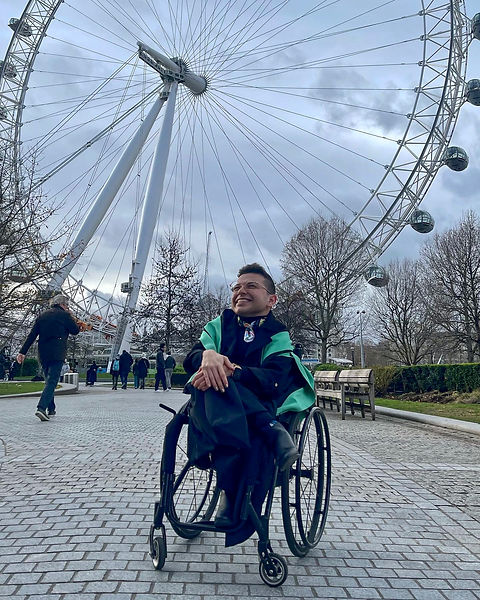

How do you find being a wheelchair user in the UK in 2024?
It's a mix of feelings. But overall: I feel free. You see, I moved to London in 2021 from my home country of Costa Rica. While I love my home, it also evolved to equal an environment where I couldn't be myself fully. I was always stuck home without any access to transport if it wasn't facilitated by my parents. That meant that for the great part of my first 25 years of life, I wasn't really able to explore my sexuality in a healthy and free way. While I have identified as a queer person since age 15, I wasn't really free to try new things and meet as many new people as I wanted. Especially gay men! The gay bars and spaces in Costa Rica were not wheelchair friendly. So back to 2021, after I arrived in London for my Masters program, I discovered so many different and free ways to explore the city, while also enjoying free healthcare under the NHS insurance, that the next layer of my life came to be 1st in priority: myself.
London is amazingly wheelchair friendly. You'll hear many people with disabilities disagree with me there, and it's true; I'm not saying it is the best city for accessibility, BUT it is definitely one of the best. And it continues to reinvent and upgrade their accessibility measures to make physical access and transport as seamless as possible.
Do you find LGBTQ+ spaces generally user friendly?
So... Way more often here in the UK than in Costa Rica? For sure. But I have had my fair share of times when I've encountered a queer space that did not have wheelchair access. However, they have always always always been very kind to try to make it happen as well. Not an excuse to not make them accessible, but at the very least they know they are doing wrong by not making their venues accessible and also I can acknowledge how it can be outside of their control due to budget reasons. I feel that in general terms, the UK has so much more aperture to disability and sexuality, just in the collective minds of people; they seem to be more open to the idea of dating people with disabilities and seeing couples with someone who has a disability. However, it is still an issue and a lot of discrimination happens where people with disabilities are ignored as options, especially, I will dare say, in the queer communities.

What made you move to London?
Initially, my Masters program. I received a scholarship called Chevening that helped me get my MA in Digital Culture and Society at King's College London. Then, having experienced all the different ways that London can help me be myself and be independent, I wanted to move here permanently and work. It has been tough because migrating as a person with a disability is definitely not ideal, but it has also been quite an enriching process. I keep trying to reflect all of this on my online blog of @TheWheelsBlog on Instagram and TikTok where I try to explain all of this through my personal life and experiences.
Where in the world is your favourite place?
Nowadays, my personal answer is truly London. I just feel so much love and gratefulness towards this city. I will say it is the capital of diversity.
Do you feel in the UK we are going backwards with LGBTQ+ rights at the moment?
No, I would suggest there are definitely far right and conservative political currents that the country needs to beware of, as in any other country around the world, but I believe that culturally and socially, the country continues to grow their believes on an equal society for queer people. Unfortunately, those far right movement minds are often the ones elected, because those who believe in equality have lost their respect on politics and end up misusing their votes or skipping their right to vote altogether. It's a shame, because it is the foundation for change in our democratic societies.

What are your plans for the next 12 months?
I want to keep living as happily as I have since moving here. I want to continue expressing my views on disability and sexuality online and hoping that it reflects by making my community online bigger, but I honestly feel no pressure on that, because these topics can only get to people at certain moments of their lives and the algorithms don't enable for that. So I am happy sharing what I can and when I can, with the objective of getting to anyone that needs to see it and maybe even get to know them, because, as I always say, accessibility is not made through ramps or elevators, but rather by making us people with disabilities access other people through questions, friendships, relationships, and connections of all sorts.